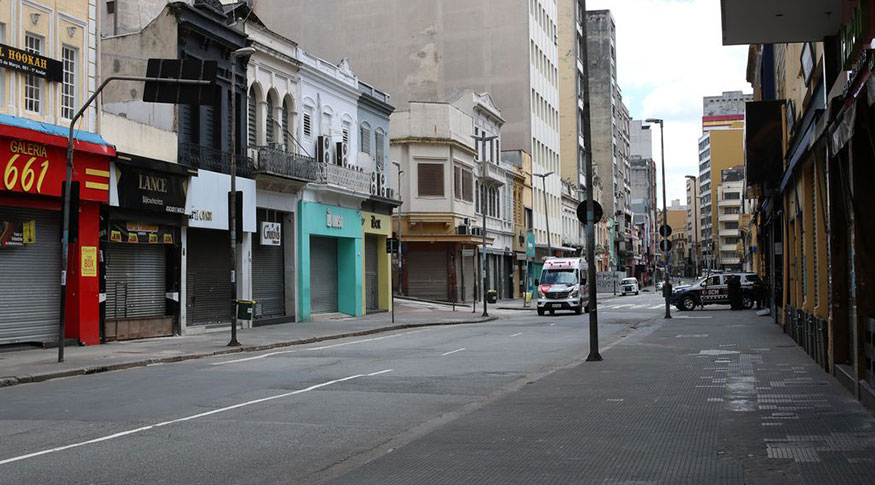Trade
Drop of 16.8% in retail sales in April is the sharpest in 20 years
June 16, 2020 09h00 AM | Last Updated: June 19, 2020 05h38 PM

Retail sales fell 16.8% in April, compared to the previous month, reflecting the effects of social isolation to control the Covid-19 pandemic. It is the worst result since the beginning of the time series, in January 2000, and the second consecutive fall, accumulating a loss of 18.6% in the period. The data are from the Monthly Survey of Trade (PMC), released today (16) by the IBGE.
The drop in retail sales reached all eight activities surveyed, for the third time since the beginning of the series. The biggest fall was in Textiles, wearing apparel and footwear (-60.6%), followed by Books, newspapers, magazines and stationery (-43.4%) and Other personal and household articles (-29.5%).
It is the first time that the survey covers a month which was fully affected by social isolation, since it was adopted in the second half of March.
The sectors of Hypermarkets, supermarkets, food products, beverages and tobacco (-11.8%) and Pharmaceutical, medical, orthopedic articles and toiletries (-17%), whose activities are considered essential in the pandemic and which had progress in the past month, fell in April.
“In March, we expected a scenario where the essential activities offset part of the sales of other activities that had a great decrease, but not this time. There was also a reduction in the wage bill, between the quarter closed in March and the one closed in April, which decreased 3.3%, about R$ 7 billion. It also reflected in the essential activities”, says the PMC manager, Cristiano Santos.
In April, office, computer and communication equipment and material, (-29.5%), furniture and household appliances (-20.1%) and Fuels and lubricants (-15.1%) are in the group of activities that had decrease.
The volume of sales in the extended retail trade, which includes the activities motor vehicles, motorcycles, parts and bodies (-36.2%) and construction materials (-1.9%), decreased 17.5% this month. “Regarding the extended retail trade, it was already in a sharpest downward trend since last month (-13.7%), specially due to vehicles, motorcycles, parts and pieces”, says Mr. Santos.
Sales achieved the lowest level, recording the greatest distances from the historical records, both for retail trade (22.7% under the record level, in October 2014) and for extended retail trade (34.1% under the record level, in August 2012).
According the survey manager, the result of the volume of salesin retail trade intensifies the March results, when the impact was not entirely evidenced. From all surveyed companies, 28.1% reported the impact in their revenue in April due to social distancing, against 14.5% in March.
In relation to April 2019, sales in retail trade drop 16.8%
Compared with April last year, the retail trade decreased 16.8%, as seven out of the eight surveyed activities have retreated. The activities with falls were Textiles, wearing apparel and footwear (-75.5%), Other personal and household articles (-45.6%), Furniture and household appliances (-35.8%), Fuels and lubricants (-25.3%), Pharmaceutical, medical, orthopedic articles and toiletries (-9.7%), Office equipment and material, computer and communication (-45.4%) and Books, papers, magazines and stationery (-65.6%).
Conversely, Hypermarkets, supermarkets, food, beverage and tobacco (4.7%) was the only sector that recorded increase, but with less intensity than in March (11.0%).
In the same comparison, with decrease of 27.1%, the result for extended retail trade reflected mainly the performance of the activities Vehicles, motorcycles, parts and pieces (-57.9%) and Construction material (-21.1%), totaling nine out of ten in this indicator.
Retail trade drops in all Federation Units
In April, the national average rate of sales in retail trade decreased in all 27 Federation Units, with a highlight to Amapá (-33.7%), Rondônia (-21.8%) and Ceará (-20.2%). The extended retail trade also recorded negative change in the all 27 Federation Units in the same comparison, with a highlight to Amapá (-31.6%), Espirito Santo (-23.4%) and São Paulo (-23.3%).
In comparison with the same month last year, the sales decrease in the national retail trade was also recorded in all 27 Federation Units, with a highlight to Amapá (-42.8%), Rondônia (-40.8%) and Ceará (-33.8%). Moreover, the extended retail trade, also in the comparison with April 2019, recorded negative results in all 27 Federation Units, with a highlight to Amapá (-41.4%), Ceará (-37.2%) and Rondônia (-35.9%).




















